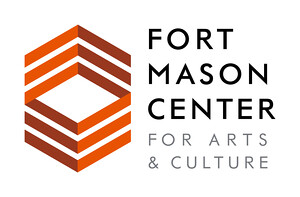Playtime
December 1, 2017–February 11, 2018
2 Marina Blvd.
San Francisco, CA 94123
USA
Hours: Wednesday–Sunday 11am–7pm
Fort Mason Center for Arts & Culture (FMCAC) is pleased to announce Playtime, an ambitious exhibition of three video installations by award-winning British artist Isaac Julien exploring the wide-ranging effects of how information, labor, and capital circulate in our global, networked societies. Playtime is presented in partnership with San Francisco Art Institute (SFAI) and the Kramlich Collection.
The exhibition includes the US premiere of Julien’s seven-screen installation, Playtime, featuring a cast of international film stars, including James Franco, Maggie Cheung, and Mercedes Cabral. KAPITAL, a two-screen companion piece to Playtime, documents the public discussion, “Choreographing Capital,” held at London’s Hayward Gallery between the artist, social theorist David Harvey, and an audience of academic luminaries such as Irit Rogoff, Paul Gilroy and the late Stuart Hall. Better Life (Ten Thousand Waves), the cinematic cut of Julien’s monumental Ten Thousand Waves, filmed on location in China—will inaugurate SFAI’s Gray Box Theater.
The presentation of these highly acclaimed works by Isaac Julien provides a unique opportunity to engage a wide audience from the Bay Area’s diverse local communities and to address salient political, cultural, and social issues that affect us all, but in vastly different ways. Julien’s visually stunning, multi-perspectival installations chronicle compelling stories that resonate poignantly with both the prosperity and inequality arising from the innovations of the high-tech economic sector.
Playtime, 2014 (67 minutes)
A post-2008 spin on Jacques Tati’s 1967 film of the same name, Playtime unfolds across three capital cities—London, Reykjavik and Dubai—that have been extensively reshaped by the recent volatilities in the global financial system. Playtime’s cosmopolitan spectacle, presented in a kaleidoscopic montage across seven large screens, interconnects the lives of its archetypical characters—hedge fund managers and art world players in London; a photographer in Reykjavik; and a Filipina house worker in Dubai—each of whom is based on a real-life individual directly affected by the market collapse. Julien visualizes the potential of capital to both create social mobility and to impede it, foregrounding the way each character inhabits and traverses the sweeping high-tech cityscapes, contemporary architecture, and sublime natural landscapes of these worldly locales. Featuring international actors James Franco, Maggie Cheung, Colin Salmon and Mercedes Cabral.
KAPITAL, 2013 (31 minutes)
As part of his preparatory research for Playtime, Julien produced a public talk in which the artist addressed the problem of representing the invisible flows and relations of capital with world-renowned Marx scholar, David Harvey. “It’s a bit like gravity,” Harvey explains, “it’s a very powerful force; it’s a relationship which makes things happen… You can really only intuit that capital exists by its effects.” Deftly editing the rich and insightful conversation with a fast-paced montage of telling moments from film and media history, Julien and his audience of invited scholars illuminate many of the driving forces and felt repercussions of 21st-century capitalism. During KAPITAL’s creation process, Julien said, “As I cannot film the thing itself, capital, I hope to film its shadow: its effects, its movements and the social relations it creates.” KAPITAL went on to be prominently featured at the 2015 Venice Biennale and has complemented Playtime at many other venues worldwide. Featuring cultural critics David Harvey and Stuart Hall.
Better Life (Ten Thousand Waves), 2010 (51 minutes)
A nighttime coast guard emergency call and rescue helicopter footage from the 2004 Morecambe Bay tragedy, in which 23 Chinese cockle pickers perished in the rising tide off the Northwest coast of England, set the scene for Julien’s poetic meditation on what drives people to search for a “better life.” Over four years, Julien researched contemporary and historic Chinese culture and collaborated with many of China’s leading creative talents, including film stars Maggie Cheung and Zhao Tao, poet Wang Ping, and media artist Yang Fudong. Filmed in both contemporary and historic Shanghai, and in the breathtaking subtropical mountains of Guangxi province, the visually luscious video interweaves contemporary struggles of daily life with ancient mythology and historical artistic forms. A central figure is the ancient Goddess Mazu, protector of seafarers—a powerful deity in the legends of Fujian, the native home of the lost cockle pickers. In Better Life Mazu bears witness to the contemporary tragedy of Morecambe Bay through parallel stories of wandering fishermen in the 15th-century Ming period and the making of the film The Goddess (1934) in modern Shanghai. Featuring international actors Maggie Cheung and Zhao Tao.
Fort Mason Center for Arts & Culture presents Isaac Julien Playtime in partnership with San Francisco Art Institute and the Kramlich Collection. Generous support provided by Grants for the Arts, Jessica Silverman Gallery, Metro Pictures, NY and Victoria Miro, London.
Contact
Nick Kinsey, Director of External Affairs, FMCAC, nick [at] fortmason.org / T +1 415 345 7530
Fort Mason Center for Arts & Culture
A decommissioned military installation converted into a nonprofit cultural center in 1977, FMCAC has long been host to a lively mix of arts, educational, and cultural programming. Each year FMCAC provides more than USD 2 million in support to local arts organizations, enabling groups to produce diverse and innovative artworks at the historic waterfront campus. After four-decades as an arts and culture destination, FMCAC is focused on reinvigorating its programming and amenities to better engage the evolving and dynamic Bay Area creative community.
San Francisco Art Institute
Founded in 1871, SFAI is one of the country’s oldest and most prestigious institutions of higher education in the practice and study of contemporary art. Committed to educating artists who will shape the future of art, culture, and society, SFAI fosters creativity and original thinking in an open, experimental, and interdisciplinary context. Opened Fall 2017, SFAI’s new 67,000 square-foot Fort Mason Campus includes art studios for students, faculty, and visiting artists and multiple gallery spaces, all located on Pier 2 at FMCAC. The site joins SFAI’s historic Chestnut Street campus to radically advance the institution’s commitment to positioning artists at the center of public life in the Bay Area and globally.



